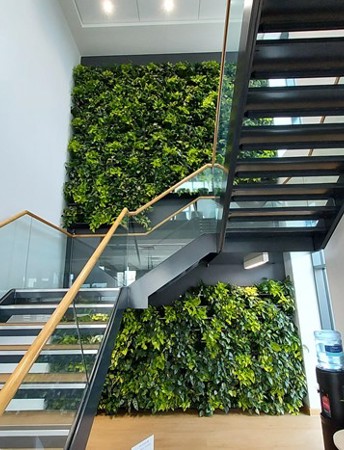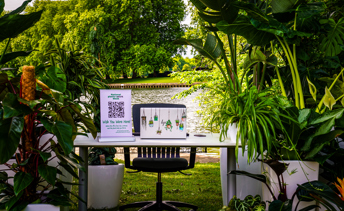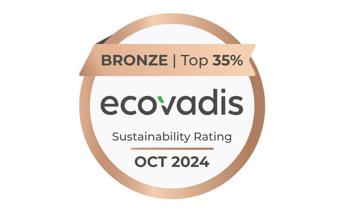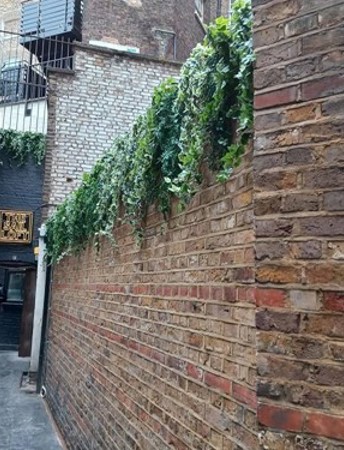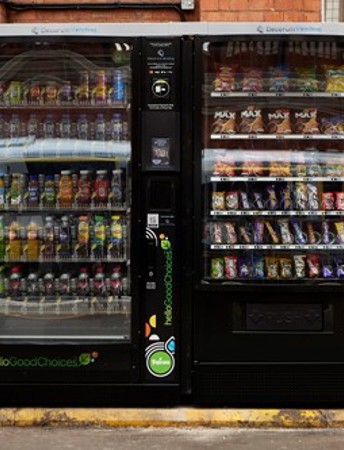In an era where environmental consciousness is at the forefront of decision-making, the landscaping industry is no exception.
One of the key considerations gaining momentum in commercial gardening and landscaping is the use of biodegradable materials. This paradigm shift towards sustainability not only aligns with global ecological concerns but also offers a myriad of benefits for both the environment and businesses.
Understanding Biodegradable Landscaping Materials
Biodegradable materials are substances that can be broken down into natural components by microorganisms, ultimately returning to the environment without causing harm.
In the realm of landscaping, the adoption of biodegradable materials is a modern idea focused around making landscaping more sustainable and reducing negative impact to the environment.
But there are many other benefits too.
Let’s take a look at just a few:
Benefits of Biodegradable Landscaping Materials
Reduced Environmental Impact
Firstly, the fact that biodegradable materials break themselves down naturally means less waste ending up in landfills. This helps to reduce the overall environmental impact of landscaping activities by minimising the amount of non-biodegradable waste that accumulates in the environment.
Using biodegradable materials can also help to conserve natural resources and reduce the need for unsustainable production practices. For example, using biodegradable mulch made from materials such as straw or wood chips can help to reduce the demand for plastic-based mulches, which are often derived from fossil fuels and can contribute to environmental pollution.
Moreover, biodegradable landscaping materials can also improve soil health and reduce chemical runoff into waterways. For instance, using biodegradable erosion control blankets made from natural fibres can help to prevent soil erosion while also decomposing into organic matter that enriches the soil.
Speaking of which:
Soil Enrichment
Natural landscaping materials breaking down also offer numerous benefits for soil enrichment. These materials break down naturally over time, enriching the soil with organic matter and essential nutrients. As they decompose, they improve the soil structure, making it more porous and better able to retain moisture.
Such natural materials also promote the growth of beneficial microorganisms in the soil, which further contribute to its fertility. By using these materials in landscaping, gardeners can increase the organic content of their soil, leading to healthier and more productive plants.
Finally, biodegradable materials can help to reduce the need for chemical fertilisers, pesticides, and herbicides, all of which can have negative impacts on soil health. This promotes a more sustainable and environmentally friendly approach to landscaping, benefiting both the soil and surrounding ecosystems.
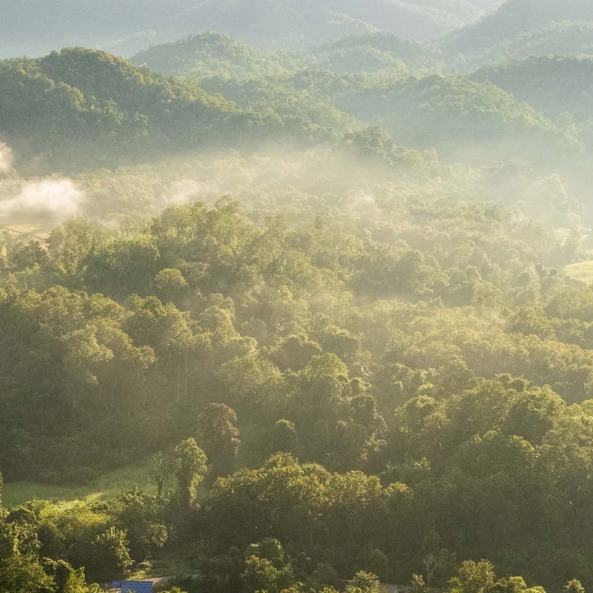
Water Conservation
Water conservation is also affected by your decision to prioritise eco-friendly gardening materials. By using biodegradable mulch, soil amendments, and erosion control products, landowners can reduce water usage in their landscaping and gardening activities. Biodegradable materials can help retain soil moisture, allowing for less frequent watering of plants and reducing water runoff. This can be particularly helpful in arid regions or during times of drought.
Additionally, biodegradable materials can improve soil quality, leading to better water retention and absorption. This can help prevent soil erosion and decrease the need for excessive watering. Furthermore, using biodegradable materials reduces the use of synthetic products, which can be harmful to water sources and aquatic life.
This of course helps with another crucial issue:

Biodiversity Preservation
Using natural, biodegradable landscaping materials offers numerous benefits for biodiversity preservation. By using biodegradable materials in landscaping, as previously touched on, we reduce the amount of plastic and non-biodegradable waste that ends up in the environment. This, in turn, helps to protect natural habitats and ecosystems for various plant and animal species.
Biodegradable materials degrade naturally over time, releasing nutrients into the soil and creating a healthier environment for plants and wildlife to thrive. In contrast, non-biodegradable materials can leach harmful chemicals into the soil and water, negatively impacting the delicate balance of biodiversity.
Additionally, biodegradable materials are often made from renewable resources, such as bamboo, coconut coir, or hemp. This reduces the reliance on finite resources and helps to minimise the ecological footprint of landscaping activities.
Brand Image
Given that our priority for this article is about having a positive impact on the external world, it may seem strange to have a section focused on benefits for your brand.
However, these benefits are significant and should not be overlooked. For eco-friendly and sustainable brands, the use of biodegradable materials in landscaping can significantly enhance their reputation. By showcasing a commitment to environmental responsibility and reducing the ecological impact of landscaping projects, brands can position themselves as leaders in sustainable practices.
Using biodegradable landscaping materials also demonstrates a brand's dedication to preserving natural resources and minimising waste. This not only aligns with the growing consumer preference for eco-conscious products and services but also sets the brand apart as a socially responsible and environmentally conscious entity.
Furthermore, the use of biodegradable materials can enhance the aesthetic appeal of the brand's landscaping, creating a visually pleasing and harmonious environment that reflects the brand's commitment to sustainability. This can attract eco-conscious customers and strengthen brand loyalty among existing customers who value environmental stewardship.
Now that we’ve broken down some of the benefits of sustainable landscaping materials, what materials actually fall under this category?
We’ve got you covered:
Types of Biodegradable Landscaping Materials
Organic Mulches
Organic mulches, such as wood chips, straw, and compost, are excellent choices for companies prioritising biodegradable landscaping materials. These mulches break down naturally over time, adding valuable organic matter to the soil and improving its structure. This process also enriches the soil with essential nutrients, promoting healthy plant growth and reducing the need for chemical fertilisers.
Organic mulches also help conserve soil moisture by reducing water evaporation and suppressing weed growth, which can save time and money on maintenance. In addition, these mulches provide insulation to plant roots, protecting them from extreme temperatures and fluctuations. Furthermore, organic mulches help prevent soil erosion and improve overall soil health by promoting beneficial microbial activity.
For companies looking to prioritise sustainability and environmental responsibility, organic mulches are necessary during the landscaping process. They support the circular economy by utilising natural materials that can be easily replenished and decomposed without leaving harmful residues in the environment. By incorporating organic mulches into their landscaping practices, companies can demonstrate their commitment to eco-friendly and biodegradable solutions.
Compostable Planting Containers
Compostable planting containers are another sustainable option worth considering. These containers are made from organic materials such as peat, wood, or paper, which are biodegradable and can be easily broken down by microorganisms in the soil. This not only reduces waste, but also promotes a more sustainable and environmentally friendly approach to landscaping.
Furthermore, when the plants outgrow the containers, they can be directly planted into the ground, eliminating the need to remove the plant from the container and reducing transplant shock. This convenience can save time and energy during landscaping projects.
Biodegradable Erosion Control Matting
Biodegradable erosion control matting is a game changer because it offers effective erosion control without harming the environment. Unlike traditional erosion control matting which is made from non-biodegradable materials such as plastic or synthetic fibres, biodegradable erosion control matting is made from natural organic materials such as coconut coir, straw, or wood fibres.
Using biodegradable erosion control matting not only helps to stabilise soil and prevent erosion, but it also reduces the carbon footprint of landscaping projects. Once the matting has served its purpose, it naturally breaks down and integrates into the soil, adding organic matter and nutrients back into the environment.
Challenges and Considerations
While the benefits of biodegradable landscaping materials are evident, it's crucial to acknowledge potential challenges. Factors such as the rate of decomposition, availability, and cost may vary. Additionally, ensuring proper waste disposal for these materials is essential to maximise their environmental benefits.
The adoption of biodegradable landscaping materials represents a transformative shift towards sustainable practices in the commercial gardening and landscaping industry. By understanding the benefits and types of biodegradable materials available, businesses can make informed choices that not only contribute to environmental preservation but also enhance their overall image and appeal to a growing eco-conscious consumer base. As the industry continues to evolve, embracing biodegradable materials is a step towards creating landscapes that harmonise with nature rather than imposing on it.
Sustainable Landscaping Services
At phs Greenleaf, we are the UK’s leading provider of commercial landscaping and gardening services for businesses.
With over 25 years’ experience of providing planting and landscaping services to businesses throughout the UK we have the knowledge of providing our services in a variety of sectors including hospitality, retail, FM’s and public sector. Which means you can be sure that phs Greenleaf will provide you with an unrivalled plant service.
We offer a wide variety of services including indoor planting and outdoor planting, artificial and live planting, living walls, grounds maintenance services and Christmas decorations.
With around 8,000 customers across the UK, Greenleaf ensures each customer is assigned an account manager to coordinate every part of the process from the initial design to the installation.
We prioritise sustainable landscaping and make use of all of the biodegradable materials mentioned in this article. We can carry out all tasks from planting and maintenance to landscaping, waste management and watering, leaving you to focus on doing what you do best.
To learn more about what we can do for you, get in touch now!




























